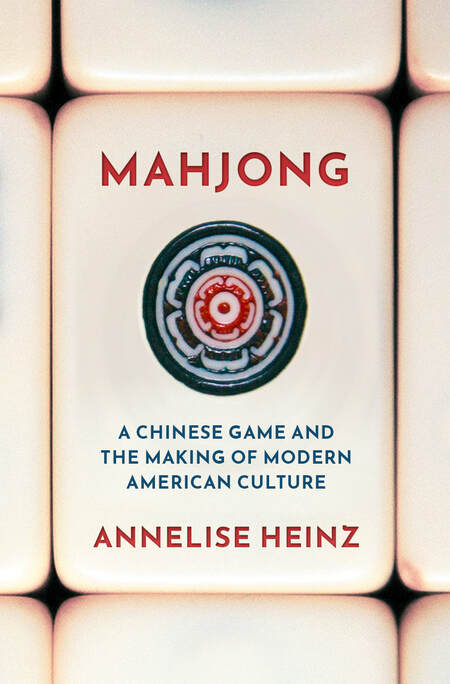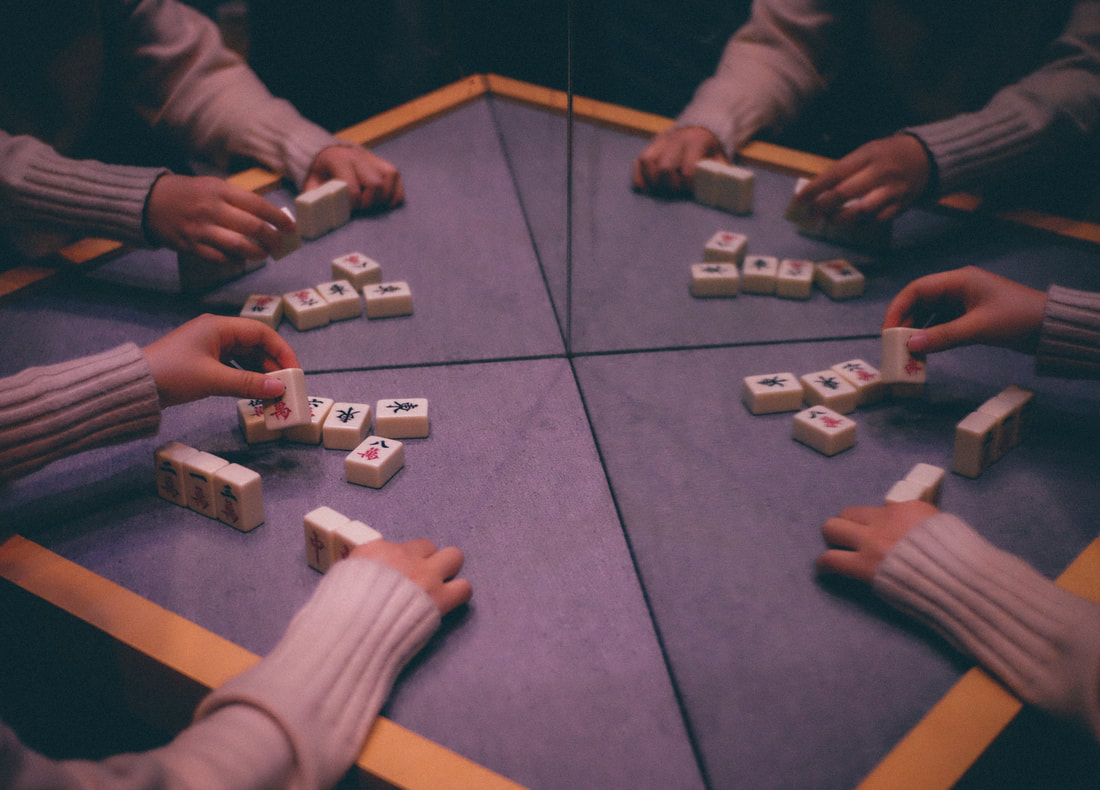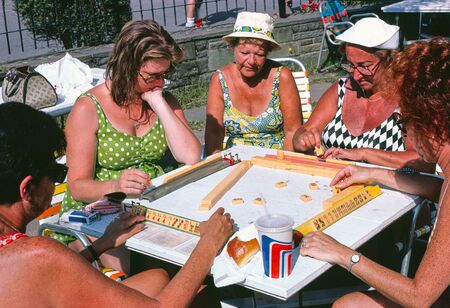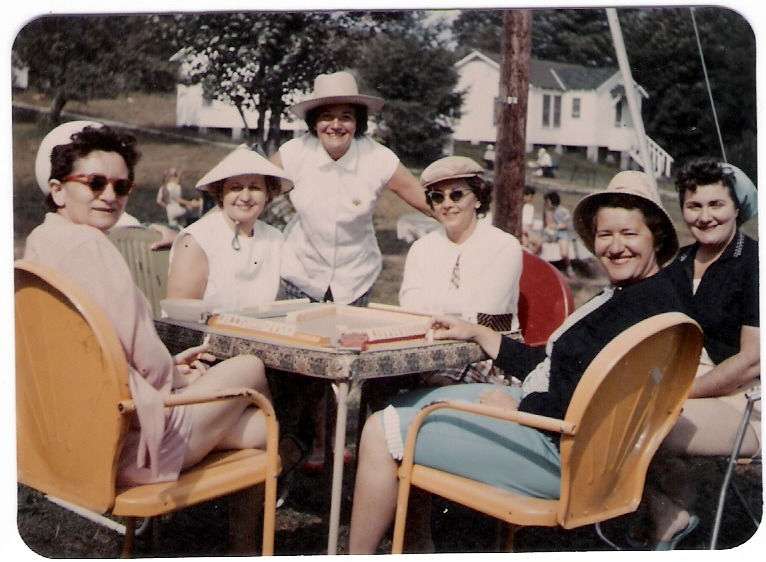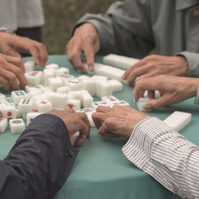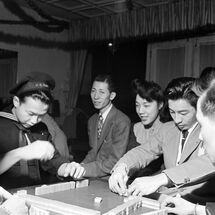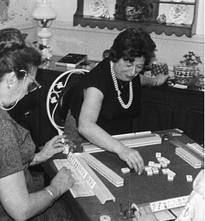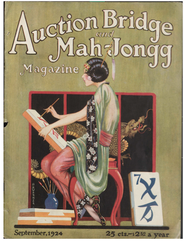Mahjong: A Chinese Game and the Making of Modern American Culture
|
Winner, Pacific Coast Branch Book Award: outstanding first book on any historical subject
Finalist, Oregon Book Award: Frances Fuller Victor Award for General Nonfiction
Finalist, Huntington Library's Shapiro Book Award: outstanding first book in American history
Reviews
"This expertly crafted material history asks what can we learn about the making of modern American culture from a parlor game? As it would turn out, quite a lot. Written in a style as engaging and lively as the subject matter itself, Mahjong investigates how the boundaries of social inclusion and exclusion evolved throughout the 20th century in complicated and often surprising ways. Ranging from the factories in which the tiles were produced to the parlors in which the game is played, Mahjong illustrates the ways in which seemingly peripheral spaces are central to the manufacturing of cultural history." – Elizabeth Rush, author of Rising: Dispatches from the New American Shore
"Annelise Heinz's Mahjong is a beautifully written, deeply researched history of mahjong. She examines the transnational history of this game and how it has moved across national, racial, cultural, and gendered boundaries while at the same reformulating and reinforcing some of these same borders. This is a history that combines the study of leisure with labor, consumption with performance, as well as race and ethnicity with class and gender. It offers fresh interpretations of modern America by focusing on the unlikely journey of a game." – Judy Tzu-Chun Wu, author of Radicals on the Road
"What could have been presented as fun and therefore trivial, the game of mahjong, in the capable hands of Annelise Heinz, instead emerges as a serious matter in cross-cultural history, linking China and the United States. This book makes women's history, American Jewish history, and the history of class and leisure subjects that inform each other. Through deep research and clear writing, Heinz drives home the point that it is not just a game."
– Hasia Diner, New York University
"In a work of dazzling richness and scope, Annelise Heinz reveals how multiracial makers, players, and marketers of mahjong negotiated and shaped social change in everyday life for a century. Comparing the rounds played by Chinese men detained at Angel Island with the tournaments held by Japanese Americans in World War II incarceration camps underscores the meanings of recreation in confinement. Evoking the delights of the game, this fascinating study also shows how Jewish women adapted mahjong, cultivating ties of female friendship and ethnic community, while also claiming Americanness and modernity." – Valerie Matsumoto, University of California, Los Angeles
"In this lively history, Annelise Heinz shows us that mahjong is more than a game. In her deft hands, it illuminates modern consumerism, Orientalist fantasy, ethnic identity, and women's self-fashioning across the twentieth century. A richly researched, happily readable book." – Joanne Meyerowitz, author of How Sex Changed
A "reader-friendly but fully footnoted account that leaves no tile unturned." – South China Morning Post
Available for purchase in hard copy, ebook, and audiobook at: Indiebound, Amazon, Barnes and Noble, Oxford University Press, local brick-and-mortars, and wherever books are sold.
"Annelise Heinz's Mahjong is a beautifully written, deeply researched history of mahjong. She examines the transnational history of this game and how it has moved across national, racial, cultural, and gendered boundaries while at the same reformulating and reinforcing some of these same borders. This is a history that combines the study of leisure with labor, consumption with performance, as well as race and ethnicity with class and gender. It offers fresh interpretations of modern America by focusing on the unlikely journey of a game." – Judy Tzu-Chun Wu, author of Radicals on the Road
"What could have been presented as fun and therefore trivial, the game of mahjong, in the capable hands of Annelise Heinz, instead emerges as a serious matter in cross-cultural history, linking China and the United States. This book makes women's history, American Jewish history, and the history of class and leisure subjects that inform each other. Through deep research and clear writing, Heinz drives home the point that it is not just a game."
– Hasia Diner, New York University
"In a work of dazzling richness and scope, Annelise Heinz reveals how multiracial makers, players, and marketers of mahjong negotiated and shaped social change in everyday life for a century. Comparing the rounds played by Chinese men detained at Angel Island with the tournaments held by Japanese Americans in World War II incarceration camps underscores the meanings of recreation in confinement. Evoking the delights of the game, this fascinating study also shows how Jewish women adapted mahjong, cultivating ties of female friendship and ethnic community, while also claiming Americanness and modernity." – Valerie Matsumoto, University of California, Los Angeles
"In this lively history, Annelise Heinz shows us that mahjong is more than a game. In her deft hands, it illuminates modern consumerism, Orientalist fantasy, ethnic identity, and women's self-fashioning across the twentieth century. A richly researched, happily readable book." – Joanne Meyerowitz, author of How Sex Changed
A "reader-friendly but fully footnoted account that leaves no tile unturned." – South China Morning Post
Available for purchase in hard copy, ebook, and audiobook at: Indiebound, Amazon, Barnes and Noble, Oxford University Press, local brick-and-mortars, and wherever books are sold.
Book Excerpts
Oxford Academic:
|
Tablet Magazine:
|
Jewish Book Council:
|
Related Articles
Saturday Evening Post:
"How Mahjong Laid Tiles for Chinese America"
|
Many Chinese Americans began playing the game in the 1920s, swept up in an enormous international fad. But the game fast became a fixture in their communities — a versatile pastime that, through the sounds and the language of gameplay, and through its visual presence in public places and in private homes, helped create spaces for a new, shared Chinese American experience.
|
Wall Street Journal:
"How Mahjong Became American"
|
On Mother’s Day in the 1950s, many Jewish women across the U.S. looked forward to one gift above all: their very own mahjong set. Mahjong, a game of skill and luck played by four people using domino-like engraved tiles, emerged in China in the 1800s, and in the 1920s it briefly sparked a global fad. By the mid-20th century it had become a hallmark of Jewish American culture. Today another mahjong resurgence is attracting new players, many of whom are learning a distinctive variation known as “American mahjong.” The game’s history offers an unusual lens through which to see the intersection of ethnicity and belonging in the U.S.
|
American Historical Review:
“Maid’s Day Off”: Leisured Domesticity in the Mid-Twentieth-Century United States
|
At the height of the mid-twentieth-century domestic revival, middle-class Jewish women created forms of “leisured domesticity,” marked by temporary female-only recreational spaces in their family-centered arenas. In contrast to other forms of recreation, with mahjong second-generation Jewish women gained an entitlement to peer-oriented leisure in the site of domestic labor: the home.
| |||||||
Frontiers, A Journal of Women Studies:
Performing Mahjong in the 1920s: White Women, Chinese Americans, and the Fear of Cultural Seduction
|
In the 1920s, Americans did not just play mahjong; they built an entire performative culture around it, from galas to garden plays. As the game quickly became feminized, society pages featured mahjong matrons dressed in Chinese costume. While white women used mahjong as a tool to experiment with new boundaries of respectable femininity, Chinese Americans leveraged mahjong’s popularity for economic opportunities in a discriminatory economy. The ways in which mahjong symbolized modern American culture, buttressed by Orientalist ideas of race and gender, allowed the game to stand in for debates over white femininity. Rather than merely a temporary foray into the exotic, mahjong came to represent the threats posed by changing gender, sexual, and racial encounters during the 1920s.
| |||||||
